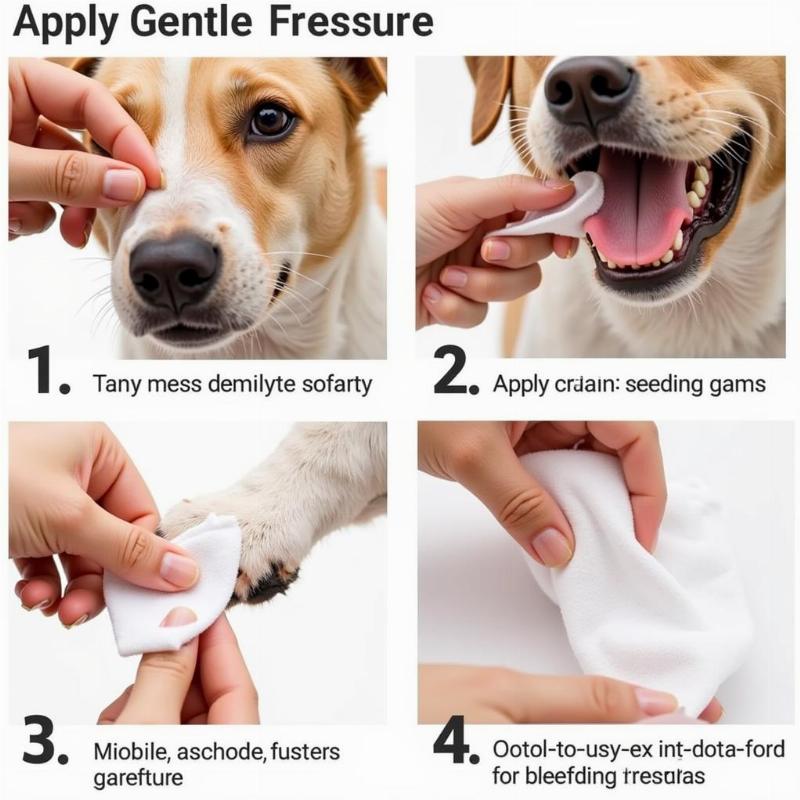A dog bleeding from the mouth can be a frightening sight for any owner. Understanding the potential causes, from a minor scrape to a more serious medical condition, is crucial for determining the appropriate response. This article will guide you through the common reasons for oral bleeding in dogs, how to assess the situation, and when to seek immediate veterinary care in the US.
Identifying the Source of the Bleeding
Pinpointing the exact location of the bleeding is the first step. Is the blood coming from the gums, teeth, tongue, or deeper within the throat? Look closely for any obvious wounds, broken teeth, or foreign objects lodged in your dog’s mouth. The color and consistency of the blood can also provide clues. Bright red blood often indicates fresh bleeding, while darker, more clotted blood may suggest an older injury.
Common Causes of Oral Bleeding in Dogs
Several factors can contribute to a dog bleeding from the mouth. Some are relatively minor, while others require urgent veterinary attention.
Dental Issues:
Periodontal disease is a frequent culprit, causing inflammation and bleeding gums. Broken or fractured teeth, often resulting from chewing on hard objects, can also lead to significant bleeding.
Trauma:
Injuries to the mouth, such as bites, cuts, or punctures from chewing on sharp objects, can cause bleeding. Foreign bodies, like sticks or bones, lodged in the mouth or throat can also lead to bleeding and infection.
Bleeding Disorders:
Certain medical conditions, like clotting disorders or poisoning, can manifest as oral bleeding. These are serious situations requiring immediate veterinary intervention.
Tumors:
While less common, tumors in the mouth or throat can cause bleeding. Regular veterinary check-ups are crucial for early detection.
When to Seek Veterinary Care
If your dog is bleeding from the mouth, it’s always best to err on the side of caution. Consult a veterinarian immediately if:
- The bleeding is profuse or doesn’t stop.
- Your dog exhibits signs of pain, difficulty breathing, or weakness.
- You suspect poisoning or a bleeding disorder.
- There is a visible foreign object lodged in the mouth or throat.
- The bleeding is accompanied by vomiting or diarrhea.
First Aid for a Bleeding Dog Mouth
While awaiting veterinary care, you can take some steps to help stabilize your dog:
- Stay calm and try to keep your dog calm as well.
- Apply gentle pressure to the bleeding area using a clean cloth.
- If a foreign object is easily visible and accessible, carefully remove it.
- Do not attempt to give your dog any medications unless directed by a veterinarian.
 Sơ cứu miệng chó bị chảy máu
Sơ cứu miệng chó bị chảy máu
Conclusion
A dog bleeding from the mouth can indicate a range of issues, from minor gum irritation to a life-threatening condition. Prompt assessment, appropriate first aid, and timely veterinary care are essential for ensuring your dog’s health and well-being. Never hesitate to contact your veterinarian if you are concerned about your dog’s oral health. Early intervention can make a significant difference in the outcome.
FAQ
- What should I do if my dog is bleeding from the mouth after chewing on a bone? Examine the mouth for any remaining bone fragments and contact your veterinarian.
- Can dental disease cause bleeding in dogs? Yes, periodontal disease is a common cause of bleeding gums in dogs.
- Is it normal for a puppy to bleed from the mouth when losing teeth? Some minor bleeding is normal, but excessive bleeding should be checked by a veterinarian.
- Could rat poison cause my dog to bleed from the mouth? Yes, certain rodenticides interfere with blood clotting and can cause internal bleeding, which may manifest as oral bleeding.
- My dog has a small cut on his lip, is it serious? While minor cuts often heal on their own, it’s always best to consult a veterinarian to rule out infection or other complications.
- What are the signs of a bleeding disorder in dogs? Signs can include spontaneous bleeding from the nose, gums, or other orifices, bruising easily, and prolonged bleeding after minor injuries.
- How can I prevent my dog from injuring its mouth? Avoid giving your dog hard objects to chew on, provide appropriate chew toys, and schedule regular dental check-ups.
Related Articles on Beautdogs.us
Beautdogs.us is your premier resource for dog lifestyle information in the US. We offer expert advice on dog breeds, care, and products, catering to both novice and experienced dog owners. Our content combines veterinary expertise with engaging storytelling, making us a trusted source for comprehensive dog care. For more expert advice and personalized guidance, contact our team at [email protected] or call us at +1 501-555-7529. Visit Beautdogs.us for all your dog-related needs!